There’s this fantastic scene in Fight Club that doesn’t make sense unless you understand the message that Chuck Palahniuk has prepared for the audience.
Tyler Durden and the narrator are in a stolen Cadillac, cruising the interstate at 70 MPH in the rain. After making several derogatory comments about the narrator’s failure to achieve enlightenment, Tyler takes his hand off the wheel, urges on the accelerator and relaxes into his seat while leisurely drawing the seatbelt across his steamed rice and grilled chicken abs.
The quintessential exemplar of non-Zen, the narrator lunges across the center console and grabs hold of the wheel. The Cadillac returns to the lane but Tyler is disgusted. His voice fills the car as he yells at the narrator, “Look at you, you’re fucking pathetic! Why do you think I blew up your condo? Hitting bottom isn’t a weekend retreat, it’s not a goddamn seminar. Stop trying to control everything and just, let, go… Let go!”
The men look at each other. Then, as almost always happens in Fight Club, the narrator acquiesces.
Like a child returning a stolen toy, the abashed pupil lets go of the wheel. He puts on his seatbelt and moments later the Cadillac collides with the back of another car and both automobiles roll down an embankment in a cacophony of broken glass and twisted metal.
You’ll be forgiven if you think this review is going to be about Fight Club, it’s not. Fight Club merely presents us with an excellent allegory with which to decode the habits that guide most of the aspirational people on this planet.
If the Cadillac is life and the steering wheel is the device by which the motivated aim themselves toward a prespecified outcome, then most humans are white knuckling that wheel like the shoulders of the road are lava.
What if I told you it doesn’t have to be that way? What if I told you that it’s possible to have a rich and fulfilling life even if you’re not driving the car?
Well fuck it, I am telling you that. In this review I’m going to share the book that convinced me to realign the way I look at goals, the pursuit of “success,” and how I learned to move forward in life even when I don’t know where I’m going.
When I graduated from high school I had a series of goals that gave my life direction for the next seven or eight years. However, upon the completion of my final goal, a motorcycle trip through India inspired by Shantaram, I was left in an awkward spot. I was living in New York City, “working” for a rich dude and going out at night to build an epic social circle and take part in unprintable debauchery. And this too had been a dream of mine but none of it was making me happy. Actually I was fucking depressed and kind of hated my life.
My goals were not working and this realization created a crack in my understanding of life through which fell the subject of this month’s review: The Surrender Experiment.
The Surrender Experiment, written by Michael Singer, advocates an approach to life that’s at odds with 95% of self-help literature that’s ever been printed. Instead of crafting long-term goals and working towards them, Michael decided to let go of the steering wheel. He would not impose goals upon himself. Rather, he would take whatever opportunities were handed to him.
For example, if a friend invited him on a retreat to a Buddhist monastery, he would go. Just as he would accept a job offer even if he wasn’t sure he would be a good fit for his skills. The opportunity has arisen, therefore I shall take it.
Let’s pull over to address a key point.
Michael did not sit on his couch and expect the world to come to him, nor did he shirk responsibility. When handed an opportunity he worked hard! And pursued the chance with passion! And damn if it didn’t work out for him.
Having read this book an untold number of years ago I can’t remember all the details, but I know the basic outline. After many adventures and lessons learned, Michael eventually founded a software company that created a new system for medical billing (if I remember correctly). This company was a spectacular success and Michael ended up selling it for millions of dollars. He then used the money to found (or greatly expand?) a spiritual retreat in Florida which is still operational to this day!
After reading Michael’s book I began my own surrender experiment. The last goal I had (nightlife bonanza in NYC) hadn’t worked out for me, so rather than try to create a new set of pursuits or chase after some preordained ideals of success, I would surrender to whatever opportunity life gave me.
I had the idea to go to South America, but where?
I typed “South America” into Google Flights to find the cheapest flight to the continent.
It was to Peru, so I bought a ticket to Peru.
I typed “Peru” into Airbnb and looked for a cool place to stay.
I found a fantastic cabin right on the ocean, so I booked it.
A week before my flight was due to take off my hosts canceled my reservation.
I was pissed but I didn’t fight the circumstances. I didn’t demand that they let me stay or insist on going to the same town. I searched the area and found another place on the ocean, one village further down the coast. This time my host, Diego, didn’t cancel and I found myself in a lovely spot on the ocean. Just in front of a popular surf break, in fact. Who could have known!
On my third day Diego told me that he had a big surfboard I could borrow and I should go down to the ocean and give it a try.
So I did. I’d never picked up a surfboard before by hey, why not.
I didn’t catch a single wave and the session was as enjoyable as going through airport security, but I kept at it. I took the board out every day and eventually I got halfway decent at riding the waves. And the rest, as they say, is history.
That’s the story of how I learned the skill that has defined the last five years of my life.
Surfing has given my life meaning and structure. It’s been a reason to wake up in the morning and work hard. Surfing became a goal that has made me awfully happy, far more so than some of the other activities that I tried to impose on myself through conscious choice.
I never would have found surfing if I’d sat down with a piece of paper, white-knuckled the steering wheel and tried to plot a course for my life. At every step of the way, from getting me to Peru to the cancelling of my original Airbnb so that I would end up with Diego, the universe got me exactly where I needed to go.
I’m not religious or spiritual in any meaningful way, but I’ve had so many serendipitous experiences that it’s difficult to not understand that there’s some “wisdom” that can point you in the right direction if you’re willing to listen to it.
However, you must be willing to listen. Too many people (I believe) become fixated on goals and refuse to acknowledge the signs indicating that what they’re pursuing isn’t going to provide the nourishment their souls need. Many people have the mistaken belief that they must push through every obstacle, including unhappiness, to reach a goal while blinding themselves to the better opportunities that the universe places in front of them.
The Surrender Experiment taught me that it’s OK to steam forward without a five year plan. The Surrender Experiment also taught me how to look out for signs “from the universe” that the course I’m on is not working and I need to adjust.
Surfing has been the foundation of my life for the past half decade, but that’s changing. I’ve been living in Bali for the last few years because it’s allowed me to tackle the waves 250 days a year, but I’m tired of only seeing my family one month a year and living in a country where I don’t speak the language. And sure enough, just as the doubts were materializing, a new opportunity was presented to me; a new prospect is likely to define the next few years of my life after I leave Bali.
I will have more to say about it next year but the key point here is that I won’t hold on to the old. Although surfing has been my entire life for the past half decade, I recognize that it’s time to move on and I shall leave this behind too. Onward and upward!
Part two
Learning to listen to the universe, or trusting your intuition if that’s more palatable, isn’t only a way to navigate life-changing events. Intuition, once you learn to identify it, can be a tool to find the best place to go on vacation, what car to buy or whether to have pizza for dinner. The way I experience it isn’t as some font of wisdom that I can call upon whenever I don’t know what to do. Rather, intuition manifests as a subtle push in one direction or another at random times throughout my life.
I believe that most people don’t trust their intuition because their egoic mind hoards preconceived notions the way a mother carries her newborn infant close to her chest. Our ego convinces us that we must have this or that, so we latch onto that desire and refuse to listen when the voice in the back of our head tells us that there’s a better path to walk.
I want to clarify another point, this whole thing about not having goals. When living by the dictates of the Surrender Experiment, it’s not that one never has goals. Rather, you let the goals choose you instead of the other way around.
Prior to starting this Substack there was an eighteen month period in my life when I had no goals. I woke up every morning and asked myself: is there anything I want? And the answer was always no. So rather than self-impose some crappy desires that wouldn’t align with my life, I accepted a complete lack of direction which is scarier than it sounds. Every day I surfed, read thick books and wrote words. Sometimes a lot, sometimes a little. And I trusted that I was doing the right thing and that the time would come when this unguided lifestyle would pay off.
Lo, it did! Reading thick books was the perfect preparation for founding this Substack, and that extra practice is one of the reasons I’ve been able to write content compelling enough to attract an audience.
Today I have the goal of making enough money to afford to move back to America and live two steps above sheer poverty. I’m so laser focused on this goal that I’ve cut out almost everything in my life that doesn’t support that effort. No surfing on the crappy days, no booze, eating better, changing my online habits, having uncomfortable conversations, etc. My life has direction and I’m getting after it hard enough to make Jocko Willink proud.
Yet the chances are high that five years from now I’ll once again have nothing that I want. I will wait with an open mind and it will appear strange that I should be so unguided but experience will have convinced me that life combusts smoother when I stand by for an opportunity to present itself, rather than draw up a list of goals to chase.
As I wrap this up I would like to encourage you to read The Surrender Experiment. The book is interesting, practical and keeps the spiritual foo-foo to a minimum. As I said in the beginning, Michael Singer ended up making millions of dollars from his decision to surrender to the universe. This is not a book about some guy in a cave, burning incense and trying to pull enlightenment out of a bat’s ass crack.
Based on innumerable experiences I am convinced that there is something more to this world than meets the eye, and this “wisdom” can get you to where you need to go if only you’re willing to listen to it.
-sam





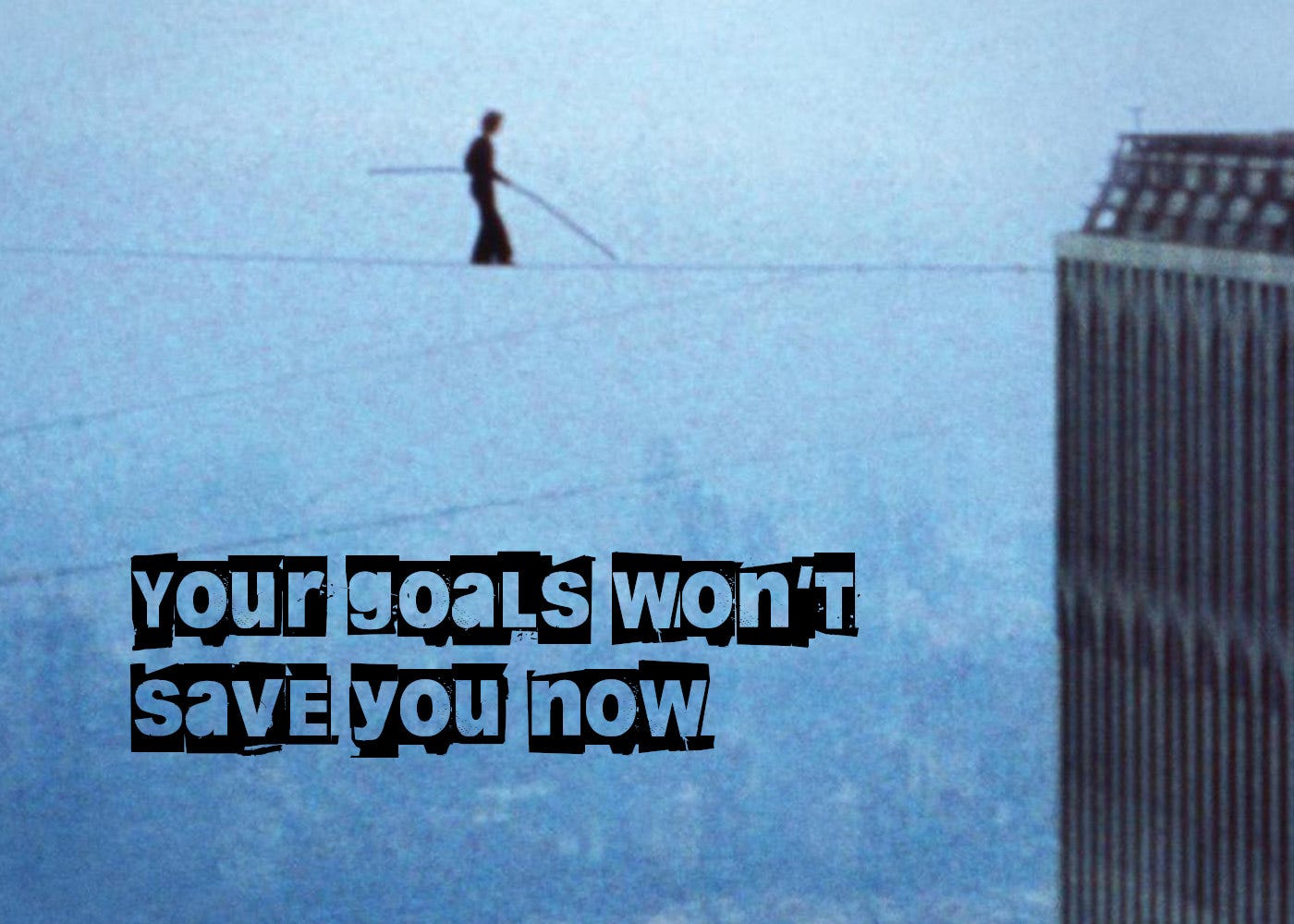
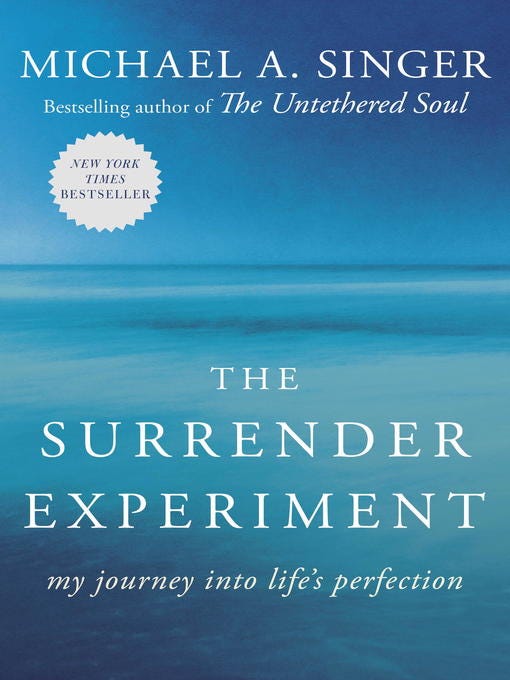
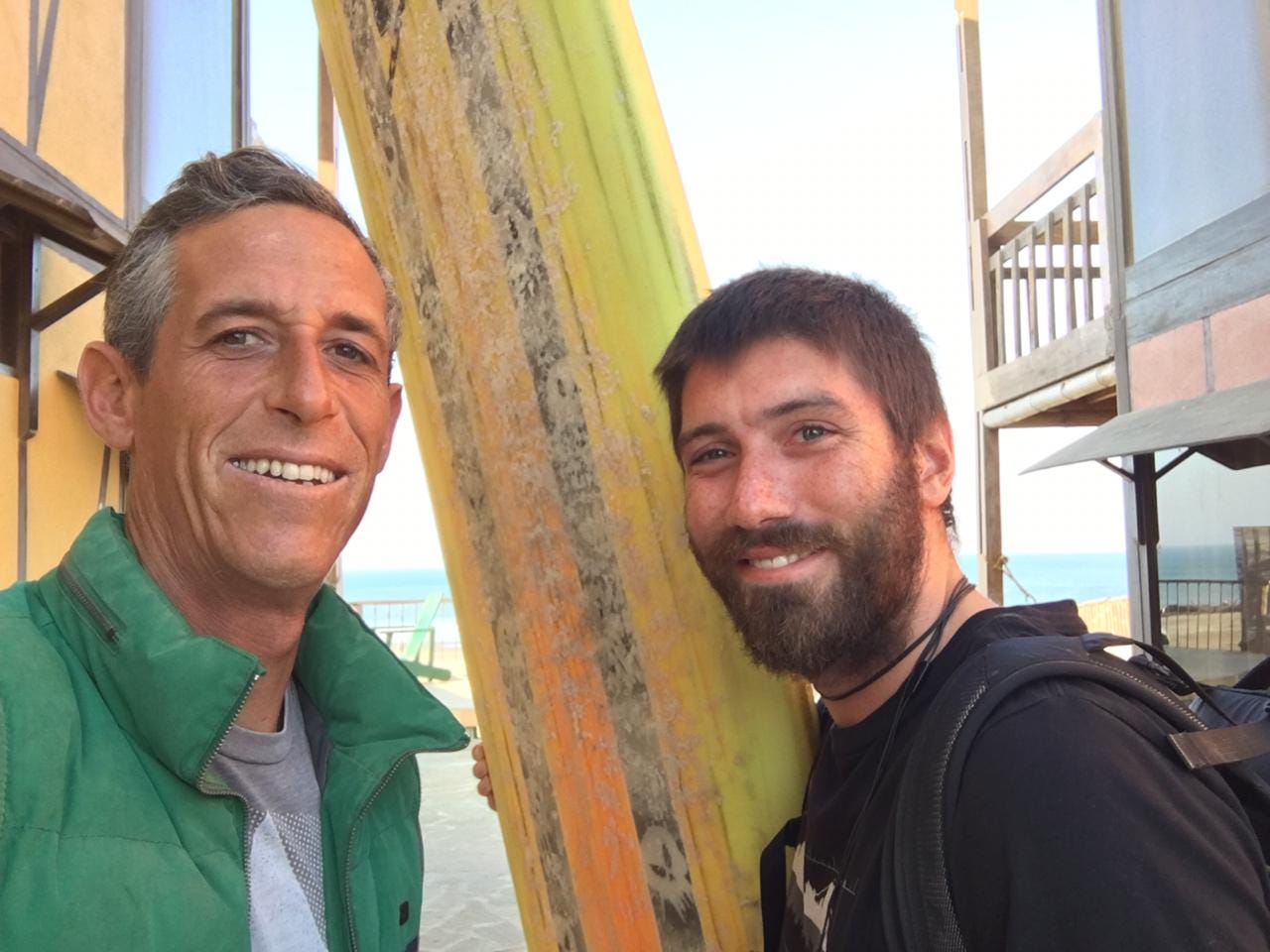

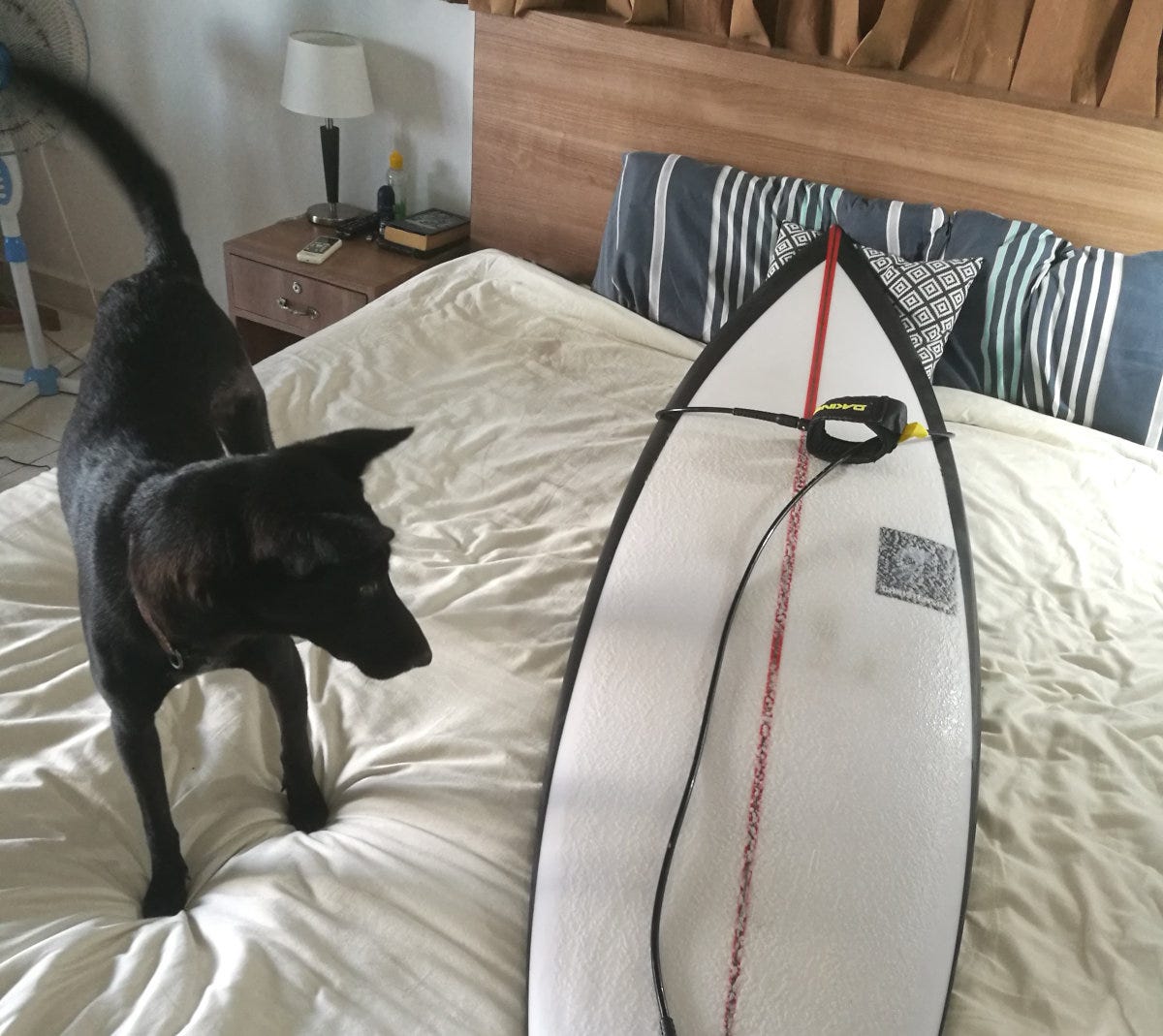
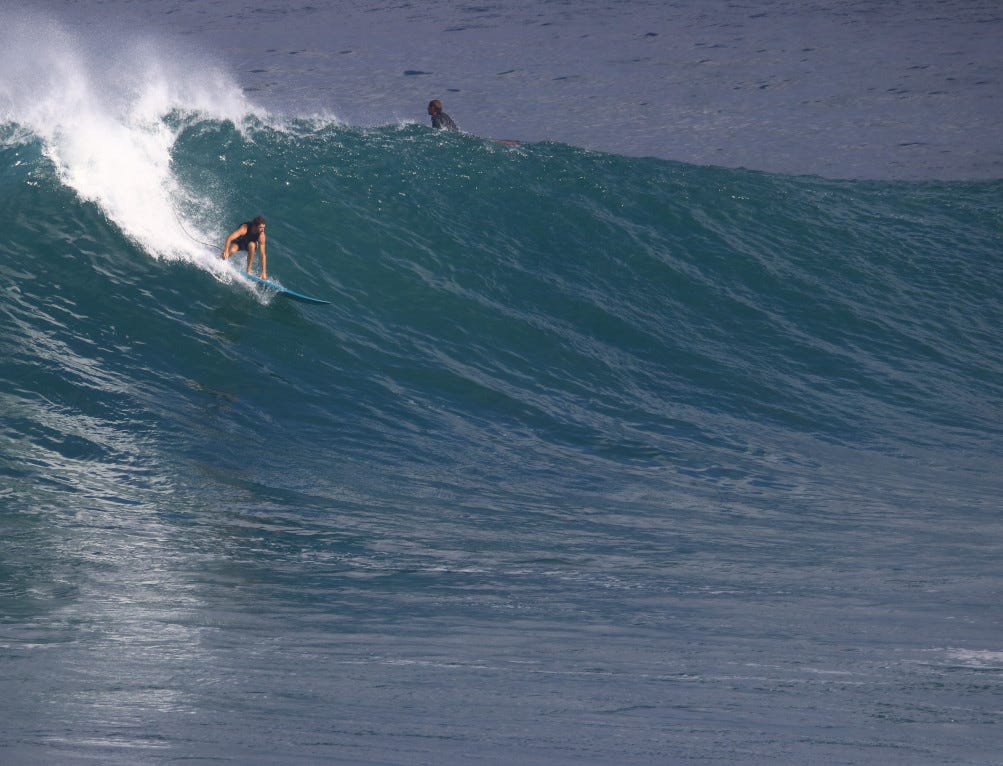
Well thanks. I didn't exactly need that. I was planning to subscribe anyway. The first part of your article made me want to read the second part, so I ponied up.
I've mostly felt that I've been riding a wave, not surfing, but impulsively grabbing what life presents when I can within the bounds of a long happy marriage in a big expensive city. I'm thinking boundaries exist whatever one's situation. You've avoided some (many, most) by surfing in Bali. You're happy. I think the poverty stricken masses I saw in India in 1971 were as happy as any peoples I've seen anywhere. (I was there in the dry season.) So maybe, I'm thinking as I scribble this, the most important part of Living Without Goals is 'Living' rather than 'Without Goals'. As Philip Roth wrote; better to be a 'liver than a pancreas'. So where does that skill come from?
A good point about saying "yes" to opportunities. I think that is separate from goals. If I had never been open to opportunities, I would never have learned how to start a website, smoke a cigar, or write a book.
The criticism against the motivational industrial complex is valid. One of the hardest lessons I learned was to trust my gut/intuition.
Congratulations on going paid!